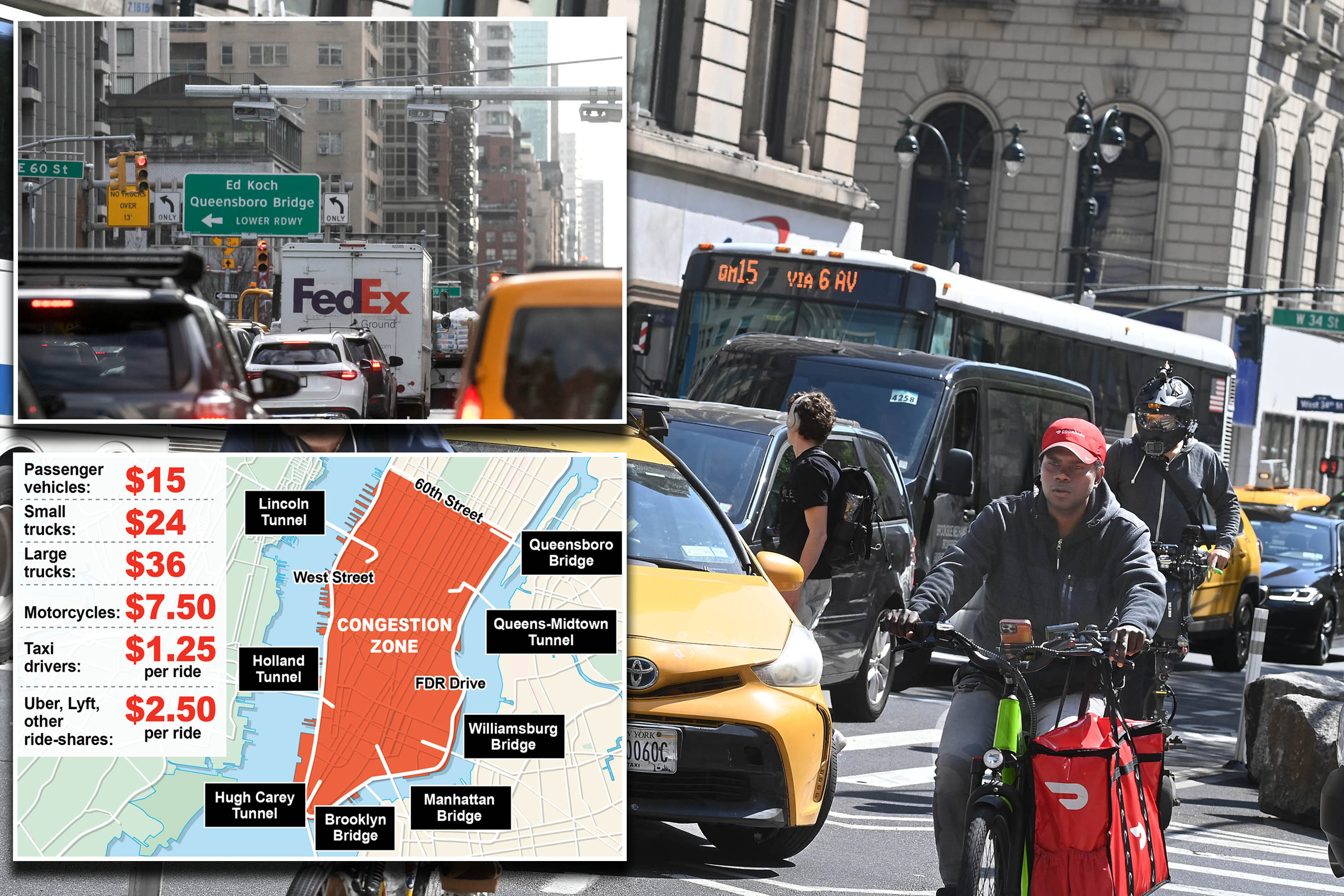
Queens lawmakers who voted for the unpopular $15 “congestion” toll to enter parts of Manhattan are demanding that the MTA increase express bus service to their neighboring borough before the new fee is imposed.
But opponents of the new toll to enter Midtown south of 60th Street scoffed that the Queens legislators are scrambling because they’re feeling the wrath from constituents over the congestion pricing law.
The call for more express bus service into Manhattan from ten Queens senators and assembly members came after the borough was excluded from similar mass transit expansions announced for Brooklyn and Staten Island bus routes.
What to know about congestion pricing
- These rates apply during peak hours, 5 am-9 pm weekdays, 9 am – 9 pm weekends. During other times, tolls are lowers to $2.75 for passenger vehicles, $6 for small trucks, $9 for large trucks, and $1.75 for motorcycles. Other rates remain the same.
- Emergency vehicles, school buses, specialized government vehicles and vehicles carrying people with disabilities are exempt.
- Drivers crossing into Manhattan using a tolled tunnel get a $5 discount.
The ten lawmakers penned a letter Wednesday to Metropolitan Transportation Authority chairman and CEO Janno Lieber, imploring him to “expand express bus service in Queens in order to attract more public transit riders when congestion pricing takes effect.”
“Express buses play a vital role in Queens’ public transit network and only stand to become even more pivotal in the near and distant future,” said the signers including state Sens. John Liu, Leroy Comrie, Toby Ann Stavisky, Michael Gianaris, Julia Salazar and James Sanders.
The Midtown toll, backed by Gov Kathy Hochul after her predecessor Andrew Cuomo approved the congestion pricing law, is expected to take effect June 30.
Many parts of southeast and northeast Queens are not near subway trains and depend on express bus service to commute to Midtown. The express bus fare is $7.
The MTA recently announced it is using state funding to provide a 10% discount for Long Island Railroad riders who are city residents and an increase in service for six express bus routes from Brooklyn and Staten Island to the Midtown “congestion relief zone.”
“It is unacceptable that Queens – one of the city’s largest transit deserts – was excluded from those express bus improvements,” said the letter writers who also included Assembly members Ed Braunstein, Nily Rozic, Alicia Hyndman, and Jessica Gonzalez-Rojas.
Gonzalez-Rojas was the only signer who didn’t vote for congestion pricing because she wasn’t in the Assembly at the time.
“The success of congestion pricing is contingent on the expansion of other forms of mass transit, especially the Queens express bus network,” they said.
Here’s everything we know about the NYC congestion pricing plan
The Metropolitan Transportation Authority’s new pricing plan that will charge drivers a minimum of $15 to enter Midtown Manhattan is set to start in June, according to reports.
The MTA has argued that the addition toll is aimed at curbing and easing peak-day congestion in Manhattan. The controversial plan will raise about $1 billion per year that would fund major upgrades to subways, commuter railroads and bus systems.
How much will drivers be charged?
- Passenger drivers: $15
- Motorcycles: $7.50
- Taxi drivers: $1.25 per ride
- Small trucks: $25
- Large trucks: $35
- Uber, Lyft, other ride-shares: $2.50 per ride
Major highways, including the FDR Drive and the West Side Hghway, are exempt from the toll, but drivers will be charged if they exit onto a street in NYC’s central business district below 60th Street.
The rush-hour rates will be in place from 5 a.m. and 9 p.m. weekdays, according to reports. During non-peak hours, the toll will be about $3.75 for a car. On weekends, the full rate will be charged between 9 a.m. and 9 p.m.
“The 10 percent monthly LIRR discount is welcome, but it is not an adequate replacement for the lack of express bus service. Access to subway and rail service is already limited throughout Queens, as many of our constituents must pay two to three fares to access the Congestion Relief Zone.”
Congresswoman Nicole Malliotakis (R-Staten Island/Brooklyn), who was a state assemblywoman when congestion pricing was approved in Albany, said Democratic lawmakers are feeling the heat.
“I’m sure they are getting an earful from their constituents,” Malliotaki said.
“Why didn’t they think about that BEFORE they voted for this cash grab and gave away their authority to the MTA to set the fee, determine exemptions and the projects it will supposedly fund? It was ridiculous for these Democrats to vote for legislation without any details.”
Yiatin Chu, a Republican candidate challenging Democratic incumbent Stavisky in the 11th district that stretches from southeast to northeast Queens, said, “Everyone I talk to is opposed to congestion pricing.”
“They’re trying to take the sting out of congestion pricing. But they’re the ones who voted for it.”
Kathryn Freed, a former judge and Democratic councilwoman who resides on the Lower East Side and is a plaintiff in the lawsuit aimed at blocking congestion pricing, said the Queens lawmakers got played.
“They just figured that out, huh?,” said Freed “All our legislators just rolled over. I don’t understand what our state legislators were thinking.”
Oral arguments in the lawsuits aimed at blocking congestion pricing will be heard in Manhattan federal court before Judge Lewis Liman Friday. Plaintiffs include the United Federation of Teachers, Staten Island Borough President Vito Fossella and a bevy of elected officials and civic leaders and small business advocates.













